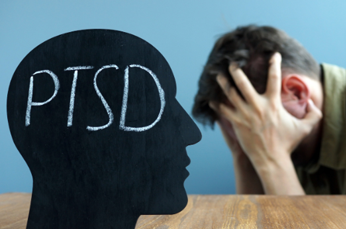Post-Traumatic Stress Disorder
 Post-traumatic stress disorder, or PTSD, is a common condition that occurs after someone has lived through a traumatic experience or event. PTSD affects 3.5 percent of the U.S. adult population, or about 7.7 million people. It is estimated that 7 or 8 out of every 100 people (or 7-8 percent of the population) will have PTSD at some point in their lives. Women are more likely to develop PTSD than men and it may run in families.
Post-traumatic stress disorder, or PTSD, is a common condition that occurs after someone has lived through a traumatic experience or event. PTSD affects 3.5 percent of the U.S. adult population, or about 7.7 million people. It is estimated that 7 or 8 out of every 100 people (or 7-8 percent of the population) will have PTSD at some point in their lives. Women are more likely to develop PTSD than men and it may run in families.
People at greatest risk for developing PTSD include:
- Victims of domestic abuse or physical violence, such as sexual assault, mugging or carjacking
- Survivors of manmade or natural disasters, such as explosions, earthquakes and wildfires
- Abused children
- Combat veterans
- First responders who aid victims in trauma situations, such as police and firefighters
Not everyone who lives through a traumatic event will develop PTSD, but you are more likely to if you:
- Directly experienced the trauma as a victim or a witness
- Were seriously hurt during the event
- Lived through a long-lasting or very severe trauma
- Believed that you and/or loved ones were in danger
- Experienced an extreme reaction during the event, such as crying, shaking or vomiting
- Were helpless during the trauma and unable to help yourself or a loved one
- Had an earlier life-threatening event or trauma, such as being abused as a child
- Have another mental health problem or family members with mental health problems
- Have recently lost a loved one, especially if it was unexpected
- Have had recent, stressful life changes
Signs & Symptoms
People experiencing PTSD have highly distressing memories that do not go away, reliving the trauma in thoughts during the day and in nightmares while asleep. These flashbacks may consist of sights, sounds, smells or feelings. They may also be triggered by common events such as a door slamming, a car backfiring or being in a place that resembles where the trauma occurred. Flashbacks may trigger the emotions and feelings that occurred when the incident happened, even though there is no danger.
People with PTSD may also feel ongoing fear or a sense of helplessness that impacts their emotional, mental and physical well-being over the long-term. PTSD can be accompanied by depression, anxiety or substance abuse. It may impact your senses of sight, taste, touch, smell and hearing. Other common responses to traumatic events include:
- Stress-related physical symptoms such as nausea, chest pain and migraines
- Changes in relationships such as withdrawal, frequent conflicts and disengagement
- Intense or unpredictable feelings such as anxiety or grief
- Changes to thoughts and behavior patterns such as recurring memories of the event
- Heightened sensory sensitivity, such as to loud or sudden noises
Tips & Recommendations
Recovering from PTSD takes time, but with help from those around you, it can be done.
Remember to:
- Ask your loved ones for support
- Communicate your feelings and experiences
- Join a local support group
- Establish/reestablish your routines
If you feel you are having trouble returning to a healthy productive life, consider seeking help if you experience
- Ongoing feelings of anxiety, distress or hopelessness
- Frequent crying
- Increased irritability, anger, and arguing
- Preferring to be alone most of the time
- Trouble concentrating and difficulty making decisions
- Increased alcohol and/or substance use
- Ongoing physical complaints such as headaches
Marriage and Family Therapists (MFTS) can help you manage your feelings and cope with PTSD.
Find a Therapist
Back